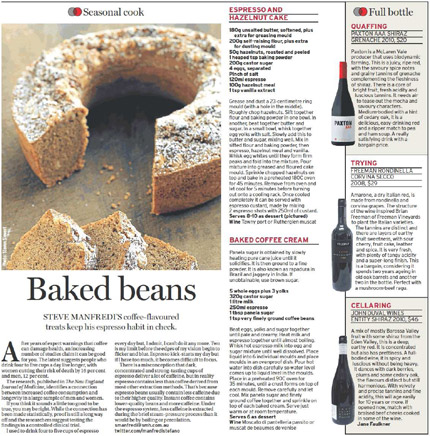
COFFEE CAKES
After years of expert warnings that coffee can damage health, an increasing number of studies claim it can be good for you. The latest suggests people who drink four to five cups a day live longer, with women cutting their risk of death by 16 per cent and men, 12 per cent.
The research, published in The New England Journal of Medicine, identifies a connection between increased coffee consumption and longevity in a large sample of men and women.
If you think it sounds a little too good to be true, you may be right. While the connection has been made statistically, proof is still a long way off and the researchers suggest testing the findings in a controlled clinical trial.
I used to drink four to five cups of espresso every day but, I admit, I can’t do it any more. Two is my limit before the edges of my vision begin to flicker and blur. Espresso kick-starts my day but if I have too much, it becomes difficult to focus.
There is a misconception that dark, concentrated and strong-tasting cups of espresso deliver a lot of caffeine, but in reality espresso contains less than coffee derived from most other extraction methods. That’s because espresso beans usually contain less caffeine due to their higher quality. Instant coffee contains lower-quality beans and more caffeine. Under the espresso system, less caffeine is extracted during the brief steam-pressure process than it would be by boiling or percolation.
ESPRESSO AND HAZELNUT CAKE
Grease and dust a 23-centimetre ring mould (with a hole in the middle). Roughly chop hazelnuts. Sift together flour and baking powder in one bowl. In another, beat together butter and sugar. In a small bowl, whisk together egg yolks with salt. Slowly add this to butter and sugar, mixing well. Mix in sifted flour and baking powder, then espresso, hazelnut meal and vanilla. Whisk egg whites until they form firm peaks and fold into the mixture. Pour mixture into greased and floured cake mould. Sprinkle chopped hazelnuts on top and bake in a preheated 180C oven for 45 minutes. Remove from oven and let cool for 5 minutes before turning out onto a cooling rack. Once cooled completely it can be served with espresso custard, made by mixing 2 espresso shots with 250ml of custard.
Serves 8-10 as dessert
Wine Tawny port or Rutherglen muscat
BAKED COFFEE CREAM
Panela sugar is obtained by slowly heating pure cane juice until it solidifies. It is then ground to a fine powder. It is also known as rapadura in Brazil and jaggery in India. If unobtainable, use brown sugar.
Beat eggs, yolks and sugar together until pale and creamy. Heat milk and espresso together until almost boiling. Whisk hot espresso milk into egg and sugar mixture until well dissolved. Place liquid into 6 individual moulds and place moulds in an ovenproof dish. Pour hot water into dish carefully so water level comes up to liquid level in the moulds. Place in a preheated 90C oven for 35 minutes, until a crust forms on top of each mould. Remove carefully and let cool. Mix panela sugar and finely ground coffee together and sprinkle on top of each baked cream. Serve just warm or at room temperature.
Serves 6 as dessert
Wine Moscato di pantelleria passito or muscat de beaumes de venise